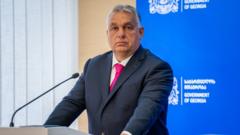Hungarian Prime Minister Viktor Orban's visit to Georgia has ignited considerable controversy, as he openly endorsed the results of a contentious election that many EU officials and international observers described as compromised. Despite allegations of misconduct and irregularities during the vote, which saw the ruling Georgian Dream party declared the winner, Orban lauded the election as "free and democratic", conveniently ignoring numerous reports of electoral violations.
Georgia's pro-Western President Salome Zourabichvili, who has rejected the election outcome, accused external influences—particularly from Russia—of orchestrating interference. Amidst the criticism, including pointed remarks from various EU states and the US, Orban dismissed concerns surrounding the electoral process, suggesting that political narratives vary based on party success.
While European Commission President Ursula von der Leyen called for swift investigations into claims of electoral malpractice, Orban's actions starkly contrasted with the EU's official stance. Even as protests erupted in Tbilisi, with thousands expressing discontent over the alleged "stolen" vote, Orban maintained his congratulatory cadence towards the ruling government.
Scrutiny intensified following reports from Georgian monitoring organization "My Vote", which documented systemic voter intimidation and manipulation strategies, including reported incidents of ballot-stuffing and carousel voting—where individuals reportedly cast multiple votes using the same identity. Amidst the uproar, the Georgian Prime Minister Irakli Kobakhidze vehemently denied any significant irregularities, labeling the claims as unfounded.
While the Georgian election commission offered assurances of integrity in the voting process, critics including Transparency International lamented a perceived erosion of governance, echoing concerns that voters were disenfranchised in a politically coercive environment. The unfolding situation remains precarious as calls for transparency grow louder against a backdrop of mixed political allegiances and nationalistic pressures.



















